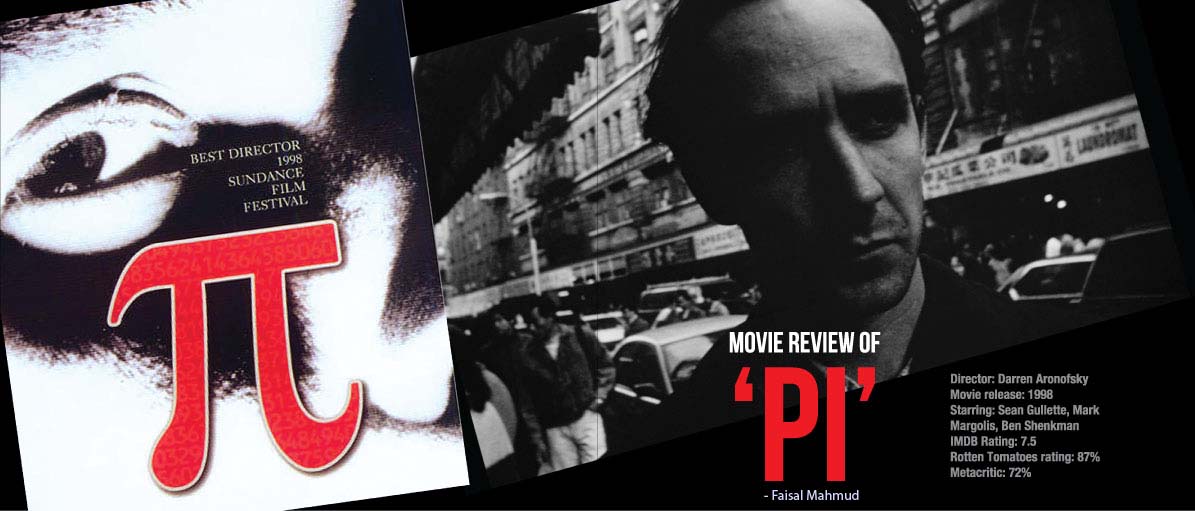
Before rose into stardom with classics like ‘Requiem For a Dream’, ‘The Wrestler’ and ‘Black Swan’, Brooklyn based director Darren Aronofsky made ‘Pi’.
This movie released in 1998 had become an instant cult classic, garnering affections and praises from movie buffs across the world.
Produced on a small budget of $60,000, the film grossed more than $3 million in America alone (despite limited theatrical release) and has sold steadily on DVD ever since. In a truly independent production, most of the budget was raised in the form of individual hundred-dollar contributions from the Aronofsky’s friends and family, and his own mother did the catering.
Aronofsky, who went to Harvard to study film, had gone to an extra length to experiment with all the obscure theories of filmmaking in producing his first full length feature film.
The story however has nothing to do with the number pi itself. It’s a metaphor for the movie as a whole.
It is a story of Max Cohen, a fictional paranoid and reclusive New York math genius, who is holed in his cheap apartment behind a door with three locks, and who talks to his homemade supercomputer, Euclid, trying to detect a pattern in the universe, in all the digits as well asin the letters of Torah. His dogmatic refusal to accept the world as a place of chaos which neither he nor anyone else can fully or even partially control lead him to the idea that there is an inherent order in the universe and that it – like absolutely everything else – is based on clean and understandable numerical laws and principles.
Max is also affected by a rare brain malaise, which causes him to have wild uncontrollable fits and hallucinations. His latest project has him popping a vein in his forehead as he tries to discover the underlying pattern in the world stock market to the point where he can predict the gains and losses of shareholders around the world right down to the last decimal.
Then one day, his iMac 5000 prints out a string of 216 seemingly random numbers right before it crash. He initially dismisses the numbers as a glitch, and then realized that they were exact predictions of the next day’s stock numbers.
After that Max is pursued by sinister Wall Street manipulators who believe he can predict the financial future, and a group of Hassidic researchers who think he has hit upon the lost name of God. Their constant persuasions make Max gone into complete bonkers.
In one of the final scenes he undergoes an almost religious experience in which he saw‘the light’ – literally. This is entirely free for interpretation. In the end, he performs a quasi-lobotomy on himself, rather unsubtly with a drill.
That’s the storyline in a nutshell. So, basically it’s about a mathematician’s descent into madness but it uses its premise particularly well with many intriguing plot points. The whole film is shot in grainy, high-contrast black-and-white with a lot of simple but effective optical and aural tricks to suggest the workings of Max’s unusual mind.
The movie has some limitations too. Pi is a film with a single narrative point of view – Max’s – everything and all the viewer sees is what he experiences. The other characters in the film, though interesting in their own way, are ultimately too shallow to sustain interest for long. There are also many questions left unresolved at the end of the film, and the viewers never really discover what Max’s ultimate fate.
Sean Gullette is wonderfully cast for the role of Max and is perfectly fine and serviceable for the most part, but is very mediocre in more dramatic and intense moments as he didn’t sell the viewers those scenes in the most convincing manner.
However, unlike many independent films, Pi actually has a fairly coherent, albeit obscure, plot. With beautifully put together scenes and fresh editing techniques, Pi is obviously an innovative masterpiece.








